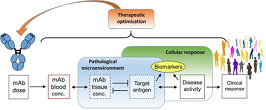Teams
Our research unit is organised in four teams.
The FRAME team studies the interactions between proteins expressing an IgG Fc portion (therapeutic antibodies and pathogenic antibodies, fusion proteins) and the Fcγ and FcRn receptors, and the resulting cellular responses. The team seeks to understand how certain elements of the microenvironment (proteases, endogenous IgG ...) have an impact on these interactions, knowing that this microenvironment itself can vary according to the diseases concerned: cancer, inflammation, etc. for therapeutic antibodies and fusion proteins; thrombocytopenia induced by heparin in our pathogenic antibody model. The FRAME team is particularly interested in the FcγRIIIA / FcγRIIA receptors and the FcRn receptors and the cellular responses they trigger: antibody-dependent cellular cytotoxicity (FcγRIIIA), platelet aggregation or secretion (FcγRIIA), antibody recycling / distribution (FcRn ), anti-tumor response (FcRn).
The PATCH team studies the sources of variability of response to therapeutic antibodies, both in terms of efficacy and adverse side effects. In this field, it evaluates individual factors that may influence their pharmacokinetics and their concentration-effect relationship in humans, particularly those related to pathological microenvironment and cellular responses. The team is also studying response biomarkers in an integrative way, using a quantitative systems pharmacology approach applied to pharmacokinetic-pharmacodynamic (PK-PD) modeling. The work of the team covers all therapeutic antibodies and therefore concerns oncology as well as immuno-inflammatory diseases and other pathologies treated by these biopharmaceuticals.
LNOx team is focused on the characterisation of oxidative stress (free radicals, antioxidative enzymes, etc.) in the pre-leukaemic states (myelodysplasia) and leukaemia in relation to the bone marrow microenvironment and more particularly within the leukaemic niche. This fundamental research opens up new therapeutic perspectives, focused on the pharmaco-modulation of oxidative stress and interactions between leukaemia cells and their microenvironment, in order to increase their chemosensitivity.
The team studies the synthesis of nitrogen heterocycles (chemical compounds whose cyclic carbon chain has one or more nitrogen atoms) with the aim of developing innovative methods of synthesis and application interface with biology.
Our scientific strategy is based on the study of interactions between small chemical molecules and their associated biological processes. Our work aims to :
- Design, by molecular modelling and synthesis, innovative heterocyclic structures to advance the methodological aspects of synthesis, and to contribute to understanding the basic mechanisms of cell proliferation in the context of the fight against cancer.
- Design new antibody-drug conjugates
- Study monoclonal antibody aggregates, using physiochemical analyses
- Design, by molecular modelling and synthesis, innovative heterocyclic structures to advance the methodological aspects of synthesis, and to contribute to understanding the basic mechanisms of cell proliferation in the context of the fight against cancer.
- Design new antibody-drug conjugates
- Study monoclonal antibody aggregates, using physiochemical analyses




